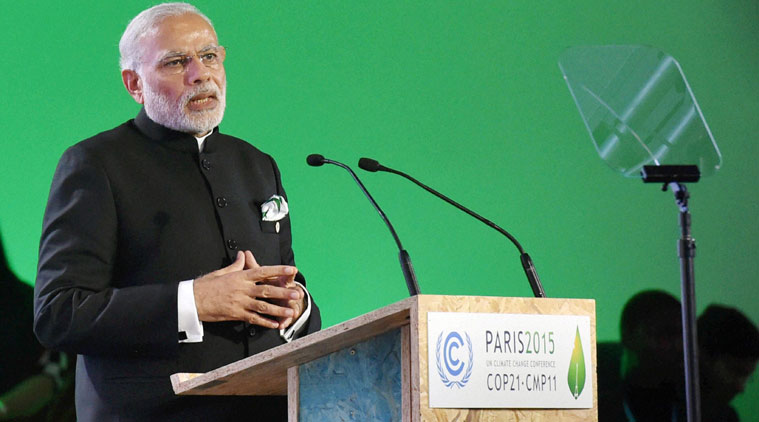 Prime Minister Narendra Modi addressing during the International Solar Alliance in Paris on Monday. (PTI Photo)
Prime Minister Narendra Modi addressing during the International Solar Alliance in Paris on Monday. (PTI Photo)
These last days have seen a fascinating demonstration of righteous assertiveness by Indians. In Paris, Narendra Modi was at the world climate conference defending India’s right to burn coal, it being the cheapest and most profuse of the country’s present sources of energy, entirely mined at home (unlike oil, imported from the world’s volatile hell-holes, and over whose price India has little positive control).
Back in smoggy India, another leader, India’s Test cricket captain Virat Kohli, was defending the country’s repeated resort to slow, turning pitches in the series against South Africa, this type of pitch being the most reliable source of victory at home for the spin-focused Indian cricket team.
In both cases, what we were seeing was a species of indignant, nationalist pushback against standards set by the West, and Western expectations of “fair play” that work to India’s apparent disadvantage.
Modi was blunt and eloquent. Having “powered their way to prosperity on fossil fuel when humanity was unaware of its impact”, he wrote in an op-ed in the Financial Times, it was “morally wrong” of the industrialised West to deny India the right to use the same sources of energy today to pull its people out of poverty. “Justice demands that, with what little carbon we can still safely burn, developing countries are allowed to grow.”
The message embedded here was that the West is guilty of double-standards in seeking to deny India access to the very fuels that had served the occident so well for centuries — and for doing so just as India is primed for a Great Leap Forward. In response to his assertion of India’s transitional developmental rights, Modi earned patronising lectures from the usual suspects, including the tirelessly sanctimonious The New York Times.
Double-standards were also the theme of the Indian cricket complaint. Responding to the barrage of English and Australian criticisms of the Nagpur pitch — where South Africa were spin-dried in just three days — the captain, manager and players of the Indian team took a leaf out of Modi’s book. Why are your standards the norm, they said to Western critics, and our standards — Indian standards — the aberration?
At issue is the belief, rife in English and Australian cricket circles, that green pitches that seam and bounce are fair and manly, the proper surfaces on which to play a game of cricket. These are the pitches one encounters in England and Australia because they are the natural products of local conditions. They also suit the style of play of teams from these countries, while cramping the style of visiting Indian players.
In contrast, Indian pitches are bereft of grass and turn early in a Test match. They are described by foreign cricket writers — often the loudest promoters of the too-much-spin-is-immoral school of thought — as Dust Bowls, conjuring images of famine, and of hardscrabble conditions unsuited to civilised cricket.
As foreign pundits took aim at India, the director of the Indian cricket team was quick to shoot back. “Which rule tells me the ball can’t turn on Day One?” said a mouthy Ravi Shastri. “Where does it tell me in the rulebook it can only swing and seam?” India has to sink or swim when playing abroad, so touring teams should expect no different in India.
As with cricket, so with carbon. “The lifestyles of a few must not crowd out the opportunities for many,” said Modi in Paris. Hands off our coal. And hands off our pitches. This is the India that can say No.
No comments:
Post a Comment